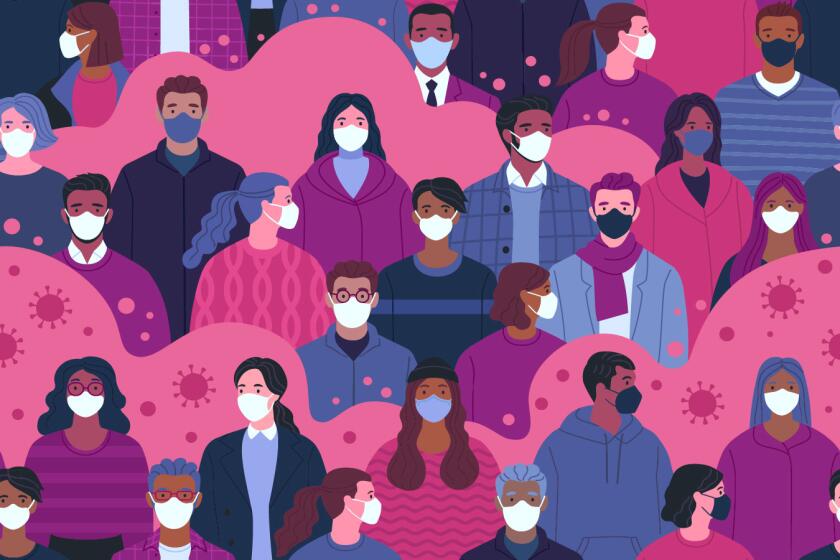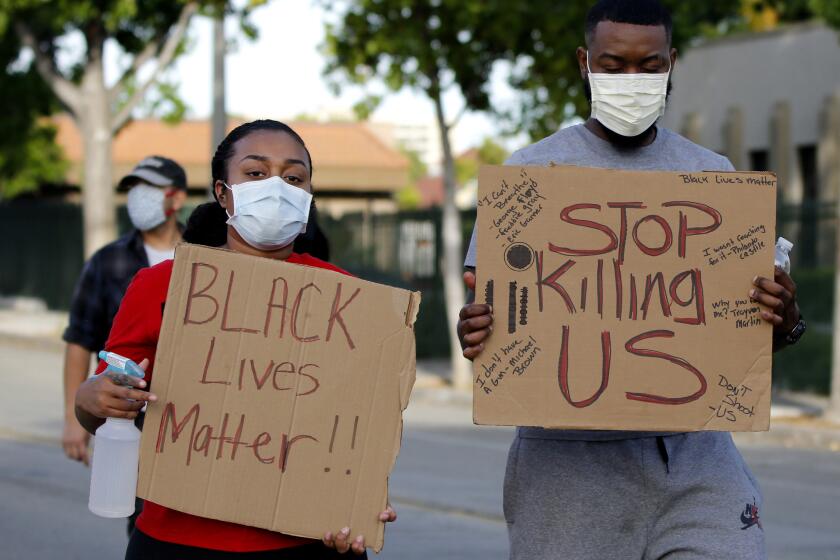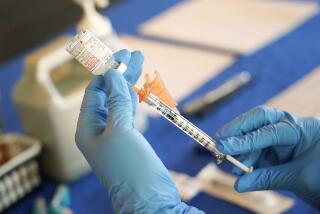The pressure is on for COVID-19 vaccine trials to reflect U.S. diversity
- Share via
When U.S. scientists launch their first large-scale clinical trials for COVID-19 vaccines this summer, Antonio Cisneros wants to make sure people like him are included.
Cisneros, who is Latino, is part of the first wave of volunteers willing to get the experimental shots to see if they can thwart the virus that sparked a deadly pandemic.
“If I am asked to participate, I will,” said Cisneros, a 34-year-old cinematographer in Los Angeles who has signed up for two large vaccine trial registries. “It seems part of our duty.”
It will take more than that to ensure the trials actually include representative numbers of Latinos, Black Americans and other racial minorities, as well as older people and those with underlying medical conditions.
In the United States, Black and Latino people have been three times as likely as white people to become infected with COVID-19 and twice as likely to die, federal data show. Asian Americans appear to account for fewer cases but have higher rates of death. Eight out of 10 COVID-19 deaths reported in the U.S. have been of people ages 65 and older.
Historically, however, those groups have been less likely to be included in clinical trials despite federal rules requiring minority and elder participation and the ongoing efforts of patient advocates to diversify these crucial medical studies.
In a summer dominated by COVID-19 and protests against racial injustice, there are growing demands that vaccine trial participants reflect the entire country.
“If Black people have been the victims of COVID-19, we’re going to be the key to unlocking the mystery of COVID-19,” said the Rev. Anthony Evans, president of the National Black Church Initiative, a coalition of 150,000 African American churches.
Evans and his team met in mid-July with officials from Moderna Inc., the biotech firm that launched the first COVID-19 vaccine trial in the U.S., to discuss a collaboration in which NBCI would supply African American participants. But that was less than two weeks before the start of a Phase 3 trial expected to enroll 30,000 people, and Evans said the meeting was his idea.
“It’s not that the industry came to me,” he said. “I went to the industry.”
The NIH has launched studies of the disproportionate impact of COVID-19 on Black and Latino Americans, hoping to prepare the country for the next epidemic.
Research shows that Black people make up about 13% of the U.S. population but only 5% of clinical trial participants, on average. Latinos account for about 18% of the population but only 1% of trial participants, on average.
When it comes to trials for vaccines and medicines, diversity matters. For reasons not always fully understood, people of different races and ethnicities can respond differently to drugs or therapies. Immune response wanes with age, so there’s a high-dose flu shot for people 65 and older.
Still, the pressure to produce an effective vaccine quickly during a pandemic could sideline efforts to ensure diversity, said Dr. Kathryn Stephenson, director of the clinical trials unit in the Center for Virology and Vaccine Research at Beth Israel Deaconess Medical Center in Boston.
“You’re accelerating development of a vaccine, and if you hit a milestone, what is the meaning of that milestone if you don’t know if it’s very safe or effective in [a given] population? Is that really hitting the milestone for everyone?” she said.
Including people who are elderly is vital to the science of vaccines, even if those patients are more difficult to recruit and are more likely to develop side effects, said Dr. Sharon Inouye, director of the Aging Brain Center and a professor of medicine at Harvard Medical School.
After all, she said, “that is the population that will be using it.”
Operation Warp Speed aims to produce 300 million doses of a COVID-19 vaccine by the end of the year. If scientists succeed, it would be a first.
New guidance from the U.S. Food and Drug Administration, which regulates vaccines, “strongly encourages” the inclusion of diverse populations in clinical vaccine development. That includes racial and ethnic minorities, elderly people and those with underlying medical problems, as well as pregnant women.
But the FDA does not require drugmakers and researchers to meet those goals, nor will it refuse trial data that doesn’t comply. And while the federal government is spending billions of dollars to fast-track more than a half-dozen leading COVID-19 vaccine candidates, the pharmaceutical firms producing them are not required to publicly disclose their demographic goals.
“This is business as usual,” said Marjorie Speers, executive director of Clinical Research Pathways, a nonprofit group in Atlanta that works to increase diversity in research. “It’s very likely these [COVID-19] trials will not include minorities because there’s not a strong statement to do that.”
The trials are being coordinated through the COVID-19 Prevention Network, which draws on four long-standing federally funded clinical trial networks, including three that target HIV and AIDS. They were chosen in large part because they have rich relationships in Black, Latino and other diverse communities, said Stephaun Wallace, the organization’s director of external relations.
“Our clinical trial sites are prepped and ready to engage diverse people,” he said.
Attracting a diverse population requires researchers to be flexible and innovative, Wallace acknowledged. Clinic hours may be limited or transportation may be an issue. Older people may have problems with sight or hearing and require extra help to follow protocols.
Distrust of the medical establishment also can be a barrier. Black Americans, for instance, have a well-founded wariness of medical experiments after the infamous Tuskegee Study and the exploitation of Henrietta Lacks.
“Part of the consideration for many groups is not wanting to feel like a guinea pig or feel like they’re being experimented on,” Wallace said.
Some public health experts are bracing for a spike in COVID-19 cases in the wake of protests against police brutality.
Moderna said the company is working to ensure that participants in its Phase 3 trial “are representative of the communities at highest risk for COVID-19 and of our diverse society.”
However, results of the company’s Phase 1 trial showed that of 45 people included in that safety test, six were Latino, two were Black, one was Asian and one was Native American.
Phase 1 and Phase 2 clinical trials assess the safety and best doses of vaccines in small groups of people. Phase 3 trials test the efficacy of the drug in tens of thousands of people.
Investigators at nearly 90 sites across the U.S. are preparing to recruit participants for Moderna’s Phase 3 trial. Dr. Carlos del Rio, executive associate dean at the Emory University School of Medicine, will seek 750 volunteers at three Atlanta-area sites. Half will receive the vaccine; half, placebo injections.
Del Rio has had marked success recruiting minorities for HIV trials and expects similar results with the COVID-19 vaccine trial. “We’re trying to do our best to get out to the communities that are most at risk,” he said.
Meanwhile, vaccine volunteers like Cisneros just want the Phase 3 trials to start. He said it’s a way for him to take action at a time when the U.S. government has failed to protect minorities, the elderly and other vulnerable people.
“Government is supposed to help those who can’t protect themselves,” he said. “It appears to me the only thing they want to protect is people with money, people with guns — and not brown people like me.”
JoNel Aleccia writes for Kaiser Health NewsKaiser Health News, an editorially independent program of the Henry J. Kaiser Family FoundationHenry J. Kaiser Family Foundation. It is not affiliated with Kaiser Permanente.









